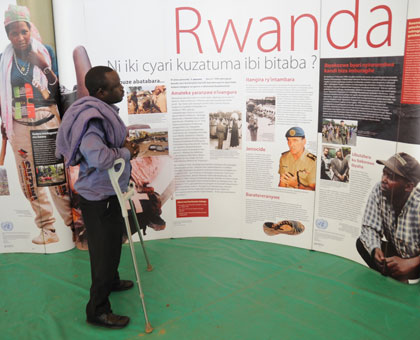The UN Security Council on Wednesday drew praises after it approved a new resolution on preventing genocide, in honour of the 20th commemoration of the 1994 Genocide against the Tutsi.


The UN Security Council on Wednesday drew praises after it approved a new resolution on preventing genocide, in honour of the 20th commemoration of the 1994 Genocide against the Tutsi.
The UNSC Resolution 2015, which calls on States to recommit to preventing and fighting genocide, based on lessons learned from the Genocide in Rwanda, is the first of its kind.
It commemorates the 1994 Genocide and notes that many Genocide suspects continue to elude justice.
The resolution also notes that the Democratic Forces for the Liberation of Rwanda (FDLR) militia leaders and members were among the perpetrators of the Genocide and stresses the importance of neutralising them.
It welcomes efforts by member States to investigate and prosecute Genocide suspects, condemns denial of the Genocide, and urges member States to develop educational programmes tailored to prevent it.
The new development, coming after the UN last month officially recognised the slaughter in Rwanda in 1994 as Genocide against the Tutsi, is considered by survivors as another blow to Genocide deniers and their agenda.
The president of Ibuka, the umbrella organisation for Genocide survivors’ associations, Prof. Jean Pierre Dusingizemungu, said the resolution is a key weapon in the global war against Genocide deniers.
"This is another important precedent if you consider their [UN] previous speeches where they did not put things right. Even their recent clarification that what happened here was Genocide against the Tutsi is critical,” Prof. Dusingizemungu said.
"This is good because it removes the cloud and confusion. It is an important weapon to fight Genocide deniers.”
Ryan Xavier D’Souza, research analyst at the Global Centre for the Responsibility to Protect, an international research and advocacy organisation, said this is the first time that the Security Council had talked about the prevention of genocide and to have an outcome resolution was equally unique.
"The fact that this comes 20 years after the 1994 Genocide is especially poignant given the Council’s monumental failure to act on early warnings to prevent the Genocide. All the ambassadors talked about the historic development of the Responsibility to Protect principle as an example of how states are working to prevent future mass atrocities,” D’Souza said.
Tabled by Rwanda, Resolution 2015 was adopted unanimously.
Ex-UNSC president ‘sorry’
Chantal Uwizera, the press attaché at Rwanda’s Permanent Mission to the UN, said the most important element is the fact that the UNSC passed a resolution, with reference "Genocide against the Tutsi.”
"It is more telling than the previous ones, which were on DRC [Res 2136 and 2147]. We have pushed for a long time to have this language inserted, and it was finally inserted, with the unanimous support of the Security Council,” Uwizera said.
Laurent Nkongori, a member of the National Human Rights Commission head, said the resolution is a good beginning in the push to track Genocide fugitives and punish them as well as pin down deniers.
"It is a positive step; we have been waiting for this. It is now time to look at the genocidaires out there in the world, including in African countries like DR Congo, Malawi, Congo-Brazzaville, and others. It is a call for the AU to take action,” Nkongoli said.
Addressing the Council, Amb. Colin Keating of New Zealand – UNSC President in 1994 – said in March and April 1994, useful reports came from the Secretariat but events were described as resurgence of civil war and not genocide.
"In my capacity as former UNSC president, I would like to apologise for what we failed to do in 1994,” he said.
Rwanda’s Permanent Representative to the UN, Amb. Eugene-Richard Gasana, told the Council that it was not lack of information of the true picture of what was happening in Rwanda, in 1994 that fuelled UN indifference, but a lack of political will.


